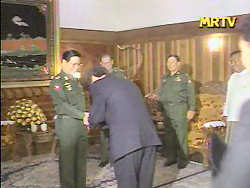 In April 2005, Finmeccanica acquired BAE Systems Avionics, Ltd. which it renamed SELEX Sensors and Airborne Systems Limited. A notice posted on December 7 on the DDTC website reveals that DDTC’s Office of Defense Trade Controls Compliance (“DTCC”) is not entirely happy with how this acquisition was handled:
In April 2005, Finmeccanica acquired BAE Systems Avionics, Ltd. which it renamed SELEX Sensors and Airborne Systems Limited. A notice posted on December 7 on the DDTC website reveals that DDTC’s Office of Defense Trade Controls Compliance (“DTCC”) is not entirely happy with how this acquisition was handled:
The Office of Defense Trade Controls Compliance (DTCC) conducted an extensive review of issues relating to the BAE Systems plc sale to Finmeccanica SpA of a majority interest in the stock in BAE Systems Avionics Limited, since renamed SELEX Sensors and Airborne Systems Limited. As a result of that review, DTCC has received written acknowledgement from BAE Systems that it did not request prior authorization from the Department of State for the sale of stock in SELEX to Finmeccanica. BAE understands that this authorization should have been obtained to address those Department of State licenses and agreements (active and expired) to which BAE Systems Avionics was a party.
You may be scratching your head and wondering where does the ITAR require prior authorization of a merger or acquisition? Section 122.4 of the ITAR requires 60-day advance written notice to DDTC if there is a transfer of control of a registrant to a foreign person, but that’s not a requirement of prior approval.
Or is it? The regulation notes that the purpose for this notification is to provide DDTC “with the information necessary to determine whether the authority of section 38(g)(6) of the Arms Export Control Act . . . should be invoked.” And section 38(g)(6) provides DDTC with the authority to require a license “before any item on the United States Munitions List is sold or otherwise transferred to the control or possession of a foreign person.”
So, although this isn’t technically a prior approval requirement, it is quite close to one. Since BAE Avionics no doubt owned items on the USML at the time of the purchase of its stock by Finmeccanica, DDTC had the right to require a license and approval for the sale. And since apparently BAE and Finmeccanica must not have filed the section 122.4 notice, DDTC never had an opportunity to invoke its discretion to require a license. DDTC seems a bit miffed about this, but not sufficiently miffed to, say, consider a penalty. Perhaps Finmeccanica’s participation in the construction of the new Marine One helicopters for the White House had something to do with DDTC’s disinterest in any enforcement action for noncompliance with section 122.4.
The other interesting part of the Finmeccanica/BAE notice is this:
New Licenses Required: Valid State Department authorizations must be replaced by new licenses reflecting the new ownership structure. Requests for new licenses must be submitted to the Office of Defense Trade Controls Licensing. Note that the transaction involves a change in ownership of an approved party and therefore a DSP-119 (amendment form) cannot be used.
The ITAR provides no guidance on the procedure to be followed with licenses after or merger or acquisition. The SIA Handbook on Mergers, Acquisitions and Divestitures, which was a cooperative effort between DDTC, the defense export industry and a number of export lawyers (including myself), tried to fill that gap. Various officials of DDTC reviewed and participated in the writing of the MAD Handbook, which was quite clear that a DSP-119 was to be used to amend licenses to reflect a change in ownership of the licensed company. That apparently has now changed, meaning that a new license, rather than a DSP-119 license amendment, must be filed for change of ownership.

 Posted by
Posted by  Category:
Category: 

 In an
In an 
 Tucked away in the
Tucked away in the  I was going to title this post “Exporter Temporarily Loses Export Privileges for Having Copy of the EAR in Its Offices.” However, after the uproar that a similar title (“
I was going to title this post “Exporter Temporarily Loses Export Privileges for Having Copy of the EAR in Its Offices.” However, after the uproar that a similar title (“

